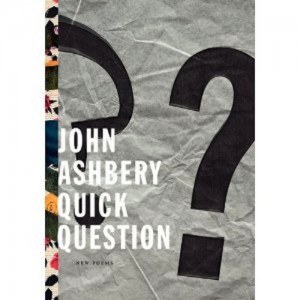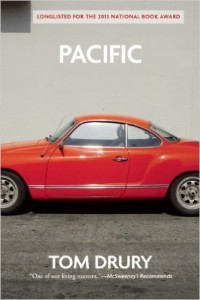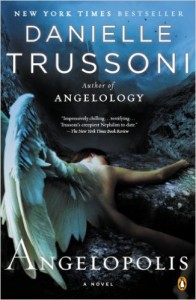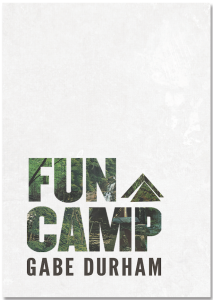Book Reviews, 06/2013
This issue
John Ashbery, Quick Question
Tom Drury, Pacific
Danielle Trussoni, Angelopolis
Gabe Durham, Fun Camp
John Ashbery | Quick Question
Ecco, 2012
by Kevin O’Rourke
 I have to admit that I felt a degree of trepidation when I decided to review Quick Question, the newest collection by John Ashbery. A brief biography for the unacquainted: John Ashbery is one the most essential American poets alive and has profoundly influenced the American poetic landscape. He has published many, many books of poetry, and has won pretty much every award possible, including the Yale Younger, the Pulitzer, the National Book Award, and the Bollingen Prize. [1] Indeed, Ashbery is so revered that The New School has an entire project—Ashlab—devoted to digitally mapping his house and art collection.
I have to admit that I felt a degree of trepidation when I decided to review Quick Question, the newest collection by John Ashbery. A brief biography for the unacquainted: John Ashbery is one the most essential American poets alive and has profoundly influenced the American poetic landscape. He has published many, many books of poetry, and has won pretty much every award possible, including the Yale Younger, the Pulitzer, the National Book Award, and the Bollingen Prize. [1] Indeed, Ashbery is so revered that The New School has an entire project—Ashlab—devoted to digitally mapping his house and art collection.
So who am I, a scantily-published product of an MFA factory working in the non-literary field of medical corporate communications, to critique anything John Ashbery writes? How could I possibly take on work that, according to Harold Bloom, is “likelier to survive the severe judgments of time” than anyone else currently writing poems in the English language? Moreover, how did I feel about criticizing, in print, the work of a poet who helped get me seriously interested in poetry in the first place?
Rather than reinvent the wheel entirely, I’ll let the Publisher’s Weekly review sum up some of my feelings about Quick Question:
“When it comes to reviews, it’s become as problematic to challenge Ashbery’s work as to praise it. Part of the reason is that with every new Ashbery collection, we encounter moments of irreducible beauty … alongside moments of cringe-worthy irony and cliché.”
Quick Question trucks in a great deal of cliché, both in the titles of its poems and the content contained therein. In addition to the title poem, several poems appropriate clichéd / hackneyed phrases for their titles. “Words to that Effect,” “The Short Answer,” “Puff Piece,” “Far Harbor,” “Laundry List,” “Absent Agenda,” and most inauspiciously, “Suburban Burma,” are just a few examples.
In many poems in QQ, clichéd language serves as a sort of shorthand or code: we know what Ashbery is getting at when he uses cliché because we understand what the cliché means. Moreover, an interview with the journalist JP O’Malley, Ashbery said that he finds clichéd language to be “somehow holy because this speech has served so many times for so many people at important moments in their lives.” This is the old ‘clichés become clichés because they’re true’ argument, applied to beauty.
However, such an approach more than often falls flat. The opening lines of “Suburban Burma” read:
Don’t try this at home. On second thought, come in,
your tumbling face ungladden. And see what happens.
The bright presence of “your tumbling face ungladden” aside, opening a poem with “Don’t try this at home” is, to quote PW again, “cringe-worthy,” and a suspect strategy at best, more at home in a terrible Amanda Palmer poem than one by John Ashbery.
It’s also clumsy. QQ’s overall tone is casual, conversational, and ruminative. In addition to the fact that QQ is made up of many short poems [2] , many of QQ’s poems make use of overtly conversational language that often, per the above example, verges on the clumsy. For example, the word “well” is seen several times in the middle of poems, as if the speaker has been caught thinking aloud. Similarly, that a significant number of poems end on questions lends them the feel of conversations overhead mid-stream, in which the absence of context creates abstraction. For example, the last five lines of “Absent Agenda” are:
Are these animals to be prized for their musk
or will the kids imbibe us, recognizing each
toy as a distinction, something to be shelved
and consulted when distracted, at some kind of grand
occasion or event no one recognizes anymore?
So. What to make of Quick Question? Does its occasional clumsiness sink it? Where does it stand in comparison to other books by Ashbery? While scanning other publications’ reviews of QQ, I noted that many of them referenced his earlier work, specifically 1975’s Self-Portrait in a Convex Mirror (which won the Pulitzer and the National Book Award). This is one of the pitfalls of being an artist: if and when your work ever attains critical or popular recognition, whatever you produce thereafter will be compared to the work that won you so much recognition, unfairly or not.
Which is not to suggest that I think Quick Question is the book to win Ashbery another Pulitzer or National Book Award. I do not. Quick Question is a minor work, an afterthought in Ashbery’s oeuvre. There is a good reason that Ashbery’s earlier work is mentioned in other reviews of this book. It is because Quick Question pales in comparison, and is not nearly as compelling.
But to quote our culture’s greatest user and creator of cliché, Yogi Berra, it ain’t over ‘til it’s over. I still plan on reading Ashbery, both because he wrote Self-Portrait in a Convex Mirror and because he writes lines like those that open the collection’s only prose poem, “Homeless Heart,” which indicate that Ashbery’s tank isn’t yet empty and that, hopefully, the best is yet to come: When I think of finishing the work, when I think of the finished work, a great sadness overtakes me, a sadness paradoxically like joy.
1. Aside: Hello, O rare reader of a poetry review who does not know who John Ashbery is! Welcome to The Fiddleback! ↩
2. 63 poems over 103 pages, or 1.63 pages/poem. This can lead to a disjointed reading experience of frequent starts and stops, not unlike watching a band play an hour-long set of three-minute songs, taking applause between every one.↩
Tom Drury | Pacific
Grove, 2013
by Brian Gebhart
 Tom Drury’s debut novel, The End of Vandalism, introduced readers to Grouse County, Iowa, and dozens of the strange, lonely, garrulous, confused, hopeful, and heartbroken people who populate it. Among them are Charles “Tiny” Darling, an aging roustabout and petty thief, Tiny’s ex-wife Louise—who later marries the county sheriff, Dan Norman—and Joan Gower, a proselytizing amateur actor who ends up, by the end of the book, married to Tiny Darling.
Tom Drury’s debut novel, The End of Vandalism, introduced readers to Grouse County, Iowa, and dozens of the strange, lonely, garrulous, confused, hopeful, and heartbroken people who populate it. Among them are Charles “Tiny” Darling, an aging roustabout and petty thief, Tiny’s ex-wife Louise—who later marries the county sheriff, Dan Norman—and Joan Gower, a proselytizing amateur actor who ends up, by the end of the book, married to Tiny Darling.
If this web of connections already has you rolling your eyes at the narrow melodramas of small-town America, let me stop you right there. Although the stage on which these characters play may be limited, their inner lives are as broad as a prairie sky. Like Sherwood Anderson’s Winesburg, Ohio, Drury’s Grouse County novels reveal psychological depths that belie his characters’ humble surroundings, and dreams that stretch as wide as the continent.
Pacific, as one might guess from the title, follows one these characters, and his dreams, across the continent (it also marks Drury’s first return to this material since his 2000 novel, Hunts in Dreams). Fourteen-year-old Micah Darling, son of Tiny and Joan, moves to L.A. to live with his mother, who has long since left Iowa to pursue her acting career. In this way, Drury tracks the movement of so many middle Americans over the course of the past century. So the novel divides its attention between Los Angeles and Iowa, and this juxtaposition creates many opportunities for Drury to deploy his famously understated wit. Soon after Micah lands on the West Coast, as Joan is driving him home from the airport, he gazes out the window at his new hometown: “Micah saw a giant woman dressed in an emerald gown and holding a violin on the side of a parking garage, and he saw the shining towers above the highways, and he thought maybe he’d made a mistake, which made everything more interesting.”
That interplay between the specific detail and the general observation, the prosaic and the epic, is typical of Drury’s prose, as is the chaotic mingling of emotion: trepidation, bewilderment, and excitement all at once. Or take this example, from a quiet scene in which a character lies awake beside her sleeping boyfriend: “She crossed his body with her leg and lay her head on his shoulder. This was the best, the most bearable loneliness.” Drury sometimes seems to wield a mystifying power with words, using the simplest language to reveal the complexities of human existence.
But the magic of language is not the only power that suffuses Pacific. The book gains an aura of grandeur and mystery when a strange young woman named Sandra Zulma enters Louise’s antique shop looking for a rock. “Some say it’s a piece of the Lia Fáil,” Sandra tells Louise. “Or it might be the stone thrown by Cúchulainn to keep Conall’s chariot from following him to Loch Echtra. Or a cairn stone left by the raiders of the Inn at Leinster.” Louise responds in classic Drury deadpan. “Gee,” she says, “I doubt we’d get anything like that here.” Sandra’s quest reunites her with a childhood friend, Jack Snow, who now fashions fake antiques out of a warehouse. Their confrontation involves two federal agents, a sword fight, and a car chase, all of which adds up to quite a bit more plot than one is accustomed to in Drury’s work. The object of Sandra’s search, and the question of its authenticity, remains cloaked in mystery to the end, which allows Drury to utilize the intrigue of a traditional quest story and play it for laughs at the same time.
In the hands of a less talented writer, this tactic might cheapen a story’s subjects. But Drury’s comedy, while it often edges toward the absurd, never peddles in sarcasm or descends into farce. And Sandra is not the only character who seems to dwell in two realms at once. Drury introduces Tiny’s mother, for instance, in this way: “She wore a large Hawaiian shirt, jeans with hammer loops, and Red Wing boots. People feared her, as if she had special powers, but she was just an old lady given to yelling at people and playing with their minds.” One begins to wonder whether—given how Drury sets “special powers” against “playing with their minds”—the distinction between the natural and the supernatural is anything more than an idiomatic one.
In an introduction to a later edition of The End of Vandalism, Paul Winner observes that Drury’s plots, such as they are, exist mainly as an excuse to move from one event to the next, rather than linking them in a chain of cause and effect. Instead of plot or character, the most central aspect of Drury’s work is tone—warmly comedic, yet sharply observed. This makes the reading experience an enjoyable but strangely languid one. It’s easy to dip in for a few pages here and there—or put the book aside for days or even weeks at a time—without worrying about losing the thread of the story.
One could also pick up Pacific without having read the two previous novels. Still, I would recommend beginning with The End of Vandalism and following the people of Grouse County across the twenty years that pass between the books. Even though the plotting is thin, there are broad themes that stretch across the years and span the miles between Iowa and the West Coast. And like the ocean that gives Pacific its name, Drury’s latest novel conceals a chaotic abundance of life beneath its deceptively calm surface.
Danielle Trussoni | Angelopolis
Viking, 2013
by Sally Franson
 In his treatise on drama, Three Uses of the Knife, David Mamet addresses an ailment that has paralyzed countless writers: the second act problem. Writers love a first act, a first chapter, or, in the case of Danielle Trussoni’s Angelology series, the first book of a trilogy. Beginnings, as any serial dater will tell you, are a lot of fun. You don’t have to put a label on what you’re doing (you don’t even have to know what you’re doing); you’re fine just keeping things casual. You can take your sweet time, say, setting up a world of evil angels and angel/human hybrids and anti-angel societies and angel hunters; you can relax into backstory and worry later about, well, the actual story.
In his treatise on drama, Three Uses of the Knife, David Mamet addresses an ailment that has paralyzed countless writers: the second act problem. Writers love a first act, a first chapter, or, in the case of Danielle Trussoni’s Angelology series, the first book of a trilogy. Beginnings, as any serial dater will tell you, are a lot of fun. You don’t have to put a label on what you’re doing (you don’t even have to know what you’re doing); you’re fine just keeping things casual. You can take your sweet time, say, setting up a world of evil angels and angel/human hybrids and anti-angel societies and angel hunters; you can relax into backstory and worry later about, well, the actual story.
And for a while the novelty of the first act/first book/first week of a relationship is enough to sustain it. Until it’s not. That, Mamet says, is the fundamental issue with Act Two. The proverbial bloom is off the rose; your proverbial partner now poops with the door open. Mamet writes, “The high-minded goal [of Act One] has devolved into what seems to be quotidian, mechanical, and ordinary drudgery: now we are not trying to establish a Jewish Homeland but negotiating a contract with a stationer to supply the paper so that we may write fundraising letters.”
Unfortunately, the second book in Trussoni’s trilogy, the recently-released Angelopolis, feels a lot like a stationer’s contract, a clunky falling to the earth [1] after our introduction to her mythic fictional universe in 2010’s Angelology. In the latter, we readers are lavished with details, vital world building that establishes the biblical stakes of the tale—the fate of humankind, the nature of good and evil, the invisible powers that govern us beyond our understanding. And if this happens to come out through lengthy chunks of expository dialogue, we’re so enraptured by the expansiveness of Trussoni’s imagination that we hardly notice.
The same cannot be said in Angelopolis, which picks up ten years after Angelology ends, for this alternate universe is already well established. And what the trilogy seems to be asking for in its second act—namely, high-octane action led by highly spirited characters—is not what Trussoni can give. Evangeline Cacciatore, the naïve protagonist of Angelology, who was introduced to the angelic world along with the reader (a clever authorial move), has only a cameo in this one; the narration is left to the formerly academic, angel-hunting Verlaine and a host of other lifeless characters who all speak in the same register: the register of robots. [2]
Which is sad, because by writing about angels instead of random supernatural beings, like werewolves, Trussoni has given herself an opportunity to ask the kind of rich human questions that all great science fiction authors address in their work: who are we? where do we come from? is God real? The door seems to be open to these questions in Angelology, but by the time we trundle through the clumsy Angelopolis, it has been firmly shut. Such questions cannot be asked by the cardboard cutouts that populate this novel.
And perhaps this deficiency might be forgiven, the way we forgive Dan Brown’s characters [3], if the novel were as action-packed as it has the potential to be. But here again, Trussoni falters. The alternate history she perpetuates is fascinating—talk of Rasputin’s link to Noah’s Ark and the nephilistic [4] Romanovs is like History Channel porn—but often this history displaces present action. If Verlaine, for example, were really on a desperate quest to find the kidnapped Evangeline, would he really subject himself to a long lesson on the significance of Fabergé’s eggs at the Hermitage? A number of the plot devices were so baffling that I had to go back and make sure I hadn’t missed something. How else would it make sense that a known traitor within angelology was allowed absolute power in its most important prison? Did Evangeline really submit to being kidnapped just because she didn’t want to be a bad person?
But here’s the thing. If this novel were better, I wouldn’t quibble about the details. The great thing about books like The DaVinci Code [5] is that the reader has no time to think about their inconsistencies—the story moves at such a rapid clip there’s no time for it to come apart in your hands. But in Angelopolis I could feel Trussoni straining with effort to create each scene, particularly the jerky nephil/angel hunter fight on the Trans-Siberian Railway. This is another mark of a problematic Act Two. For often when the drama struggles, the artist is struggling as well.
By the end of Angelopolis, Trussoni has set up, however preposterously, a whopper of a third installment, [6] which perhaps in the end is all she set out to do. Still. I can’t help but feel a great loss for the ambition of her first act; it has been replaced by something smelling eerily of commerce. A great second act “calls for the hero [and the artist [7] ] to exercise will, to create…his or her character, the strength to continue,” according to Mamet. And that will, that strength, is wholly lacking here. Did Trussoni give up and make a deal with the devil in order to make good on a fat advance? Only she knows. But plenty of great writers have fallen from artistic grace for far less than that.
1. It’s clever that I’m using this turn of phrase, see, because Trussoni’s first book was a memoir called Falling Through the Earth, which The New York Times named one of the ten best of 2006.↩
2. Consider the following argument between angel hunter Bruno and historian Vera on Fabergé’s eggs: “It’s just a piece of tsarist bling, a nicely made bauble.” / “I do not agree with your aesthetic sensibility.”↩
3. Dan Brown enthusiasts, riddle me this: has he ever written a multi-dimensional female lead?↩
4. For those of you not up to speed on angelic beings, nephilim are the offspring of angels and women. For a really, really good book about these guys, and Noah and the floor, go back and read Madeline L’Engle’s Many Waters. It won’t disappoint.↩
5. Never thought I’d say this phrase in a book review.↩
6. Though if someone could explain how the last sentence of the novel makes even a modicum of sense, I would be forever obliged.↩
7. My own addition.↩
Gabe Durham | Fun Camp
Publishing Genius, 2013
by Quincy Rhoads
 The act of going off to camp is an initiation into adulthood, but for as many socially adept teenagers who spend sweaty afternoons in canoes with summer loves or who make lanyards to trade with friends, there are campers who only want to go home, who hold up the walls at the end-of-week dance. Gabe Durham describes these disengaged loners in his new book, Fun Camp, as “unfun campers.” They refuse to engage with camp counselors or participate in any of the weekly activities.
The act of going off to camp is an initiation into adulthood, but for as many socially adept teenagers who spend sweaty afternoons in canoes with summer loves or who make lanyards to trade with friends, there are campers who only want to go home, who hold up the walls at the end-of-week dance. Gabe Durham describes these disengaged loners in his new book, Fun Camp, as “unfun campers.” They refuse to engage with camp counselors or participate in any of the weekly activities.
A lot of readers react the same way to contemporary literature, especially the “indie lit” published by Fun Camp’s Publishing Genius Press and other small presses of their ilk. When confronted with the slickly postmodern or the playfully odd, some readers recoil; they refuse to go along with the less familiar form. Gabe Durham understands what’s going on with inept vacationists and hesitant readers alike. Through a camp counselor character Durham states, “what the child really fears are his own boring impulses. And they will be broken.”
The book is divided into sections reflecting each day in a week of camp. The pieces are short letters, dramatic monologues, and snippets of euphonious conversation. Durham excels at capturing a symphony of unique voices in Fun Camp. There are few expository details and a minimum of straightforward narrative, but this is not a negative critique since the pieces form a patchwork that, when read as a whole, reflects the hurly-burly experience of summer camp itself. Read as separate pieces, the book works just as well since the quality of these sketches is so high.
The book could be a challenge for readers who prefer a more linear structure over the picture that literary collage provides: a blend of dramatic monologues, from the epistles of precocious campers to the pontifications of camp cooks; however, any mild hurdle this book may provide is well rewarded. Fun Camp offers surreal laughs, as when a camper yells “refresh inbox!” at a clothesline designated for inter-camper notes, or the ghost story pastiche around the campfire: “To this day, La Malhora appears at the crossroads whenever someone is going to die. That baby was my daughter. That psycho was me.” And the book offers surprisingly familiar pathos, as when veteran campers mourn the loss of summers gone by or when scratchy love notes are stowed in socks. Durham draws his readers in and encourages them to take part in his wackiness, just as a camp counselor would do with his acoustic guitar beside the fire.
My thirteen-year-old self was hesitant, shy, and apt to disengage at sleep-away camp, but after I let myself go and gave into the fun, I didn’t want to leave. Fun Camp struck me the same way. Give yourself over to its silliness, its slick po-mo, and like a camper, you won’t want to leave when it comes to an end.
